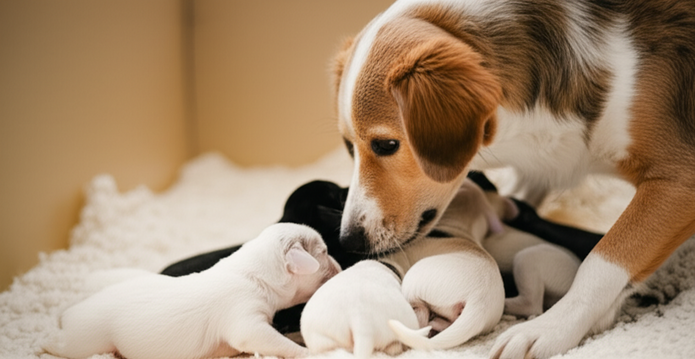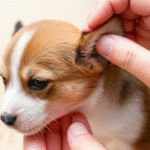Welcoming Your Newborn Puppies: Essential First Steps
Welcoming newborn puppies requires careful preparation. Create a nesting area in a warm, draft-free location, away from household traffic. The whelping box should be large enough for the mother and puppies to move around comfortably, with low sides for easy access but high enough to prevent escapes. Line the box with soft, washable bedding like old towels or blankets. Maintain a consistent temperature between 85-90°F (29-32°C) for the first few days, gradually decreasing to around 70-75°F (21-24°C) by the end of the fourth week (American Kennel Club). Ensure easy access to fresh water and food for the mother dog, placing them close to the whelping box. Observe the puppies closely for signs of illness like lethargy, lack of appetite, or difficulty breathing. If any concerns arise, consult a veterinarian immediately. Newborn puppies rely entirely on their mother for warmth and nourishment, so minimizing stress for her is crucial. Limit handling of the puppies during the first few days to allow the mother to bond with them and establish a nursing routine. After a few days, begin gentle handling sessions to get the puppies accustomed to human touch (VCA Animal Hospitals). More information on preparing for a puppy can be found in this article: Easiest Puppies To Train. A calm and nurturing environment is essential for healthy puppy development.
Feeding and Nutrition: Nourishing Your Puppies for Healthy Growth
Newborn puppies have specific dietary needs. For the first few weeks of life, mother’s milk provides all the necessary nutrients (American Kennel Club). If mother’s milk isn’t available, use a commercial puppy milk replacer (VCA Animal Hospitals). Avoid cow’s milk, as it lacks essential nutrients and can cause digestive upset (PetMD). Around 3-4 weeks of age, start introducing puppy food. Begin with a small amount of softened kibble or canned puppy food specifically formulated for growing puppies (Purina). Gradually increase the amount of food and reduce milk feedings as the puppies transition to solid food. For more information on best practices for puppy nutrition and choosing the right food, visit our comprehensive guides on best dog food for puppies and dog probiotics, freeze-dried dog food, and raw diets. A consistent feeding schedule is crucial. Newborns typically need to eat every 2-4 hours, even overnight (ASPCA). As they grow, gradually increase the time between feedings. Monitor your puppies’ weight and adjust the feeding amount to ensure they are growing at a healthy rate. If you notice any feeding issues such as diarrhea, vomiting, or lack of appetite, consult with your veterinarian. More detailed information on puppy care can be found on our article on best dog care tips.
Health and Wellness: Keeping Your Puppies Safe and Sound
Keeping newborn puppies safe requires diligent monitoring. Regularly check your puppies’ weight, temperature, and hydration. A healthy puppy should be gaining weight steadily and maintaining a temperature between 100-102°F (VCA Animal Hospitals). Observe their behavior for signs of lethargy, difficulty breathing, or persistent crying, which could indicate illness. Vaccinations are crucial for protecting your puppies from preventable diseases. Consult your veterinarian to establish a vaccination schedule (American Kennel Club). Common newborn puppy illnesses include parvovirus, distemper, and kennel cough (The Spruce Pets). If your puppy exhibits any signs of illness, such as vomiting, diarrhea, loss of appetite, or nasal discharge, seek immediate veterinary care. Early diagnosis and treatment are essential. For more insights into puppy care, visit our comprehensive guides on topics like crate training and dealing with puppy biting: Puppy Whining in Crate and The Complete Guide to Puppy Biting Solutions.
Socialization and Training: Shaping Your Puppies’ Behavior
Early socialization is crucial for puppies. Introduce your puppy to various sights, sounds, and smells, as well as other dogs and people, to help them develop into well-adjusted adults (ASPCA). Begin basic training, like sit and stay, as early as 8 weeks old, using positive reinforcement methods such as treats and praise (The Humane Society). For housebreaking, establish a routine, take your puppy outside frequently, especially after waking up and after meals, and reward successful potty breaks (How to House Train Your Puppy). Crate training can also assist with housebreaking and provide a safe space for your puppy. If you’re facing challenges or have questions, consult with a professional dog trainer. For effective strategies to deal with puppy biting and teething, see our guide (The Complete Guide to Puppy Biting Solutions).
Puppy Development Milestones: What to Expect in the First Few Weeks
Newborn puppies are entirely dependent on their mothers for warmth and nutrition. During their first week, they primarily sleep and nurse. Their eyes and ears remain closed (American Kennel Club). Between days 7 and 14, puppies’ eyes and ears begin to open, and they start to become more aware of their surroundings (VCA Animal Hospitals). They begin to crawl and may attempt to stand. From weeks 3 to 4, puppies become more mobile and playful. They start to interact more with their littermates and develop their senses of smell and touch (Purina). This stage also marks the beginning of their socialization period, which is essential for their development. You can find more information on socializing your puppy here: How to Socialize Your Puppy: A Complete Guide. As they grow, appropriate teething toys become essential. For guidance on selecting the right toys, refer to our article: Choosing the Best Teething Toys for Puppies.
Sources
- American Kennel Club – Puppy Shots: A Complete Schedule
- American Kennel Club – Whelping Puppies 101: Everything You Need to Know
- American Kennel Club – Feeding a Newborn Puppy
- American Kennel Club – Puppy Development Timeline
- ASPCA – General Dog Care
- DogsCare.Life – Best Dog Care Tips: How to Care for a Dog Daily
- DogsCare.Life – Best Dog Food for Puppies: Choosing the Right Nutrition
- DogsCare.Life – Choosing the Best Teething Toys for Puppies
- DogsCare.Life – Dog Probiotics, Freeze-Dried Dog Food, Raw Diets: 2025 Pet Wellness Guide
- DogsCare.Life – Easiest Puppies To Train: Selecting Breeds That Learn Quickly
- DogsCare.Life – How to House Train Your Puppy: Your Complete Guide
- DogsCare.Life – How to Socialize Your Puppy: A Complete Guide
- DogsCare.Life – Puppy Whining in Crate: Understanding Causes and Solutions
- DogsCare.Life – The Complete Guide to Puppy Biting Solutions
- The Humane Society – Basic Dog Training
- PetMD – Can Puppies Drink Cow’s Milk?
- Purina – Puppy Development Stages
- Purina – Puppy Feeding Guide
- The Spruce Pets – Common Newborn Puppy Problems
- VCA Animal Hospitals – Dog Breeding, Whelping, and Puppy Care
- VCA Animal Hospitals – Feeding Orphan Puppies
- VCA Animal Hospitals – Puppy and Kitten Care
- VCA Animal Hospitals – Puppy Development Stages


